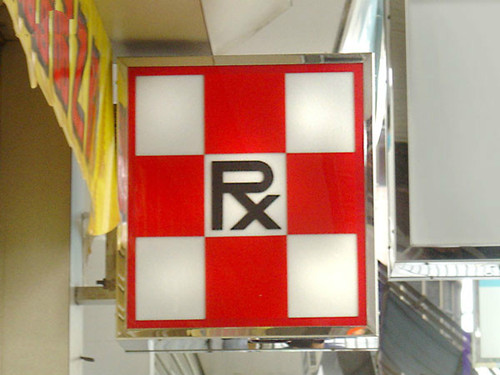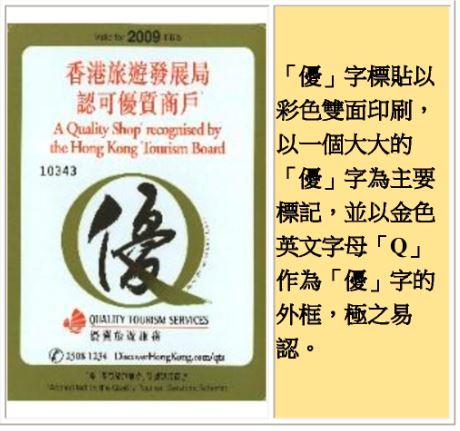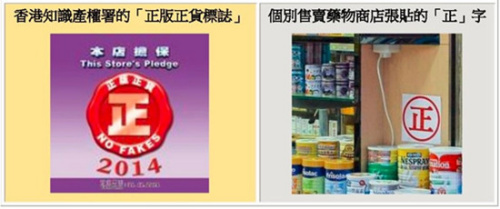
The guests at the meeting discussed Zhang Yugun’s spirit from different sides and angles.
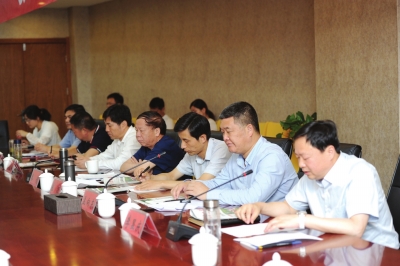
On-site guests of Zhang Yugun’s spiritual seminar exchanged ideas with each other.

Live broadcast of Zhang Yugun’s spiritual seminar through the Internet.
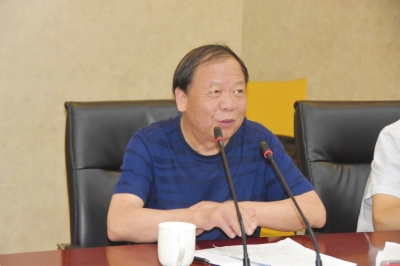
Qin Jun, a famous writer and former deputy director of Nanyang Municipal People’s Congress Standing Committee

Song Yang, Deputy Secretary of Party Committee of Nanyang Municipal Government.

Wang Guangling, Deputy Director of Propaganda Department of Nanyang Municipal Committee
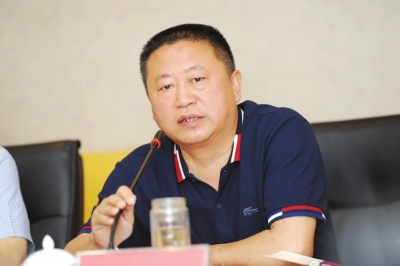
Long Yunfei, deputy director of Nanyang Education Bureau and member of the party group.

Li Xianqing, Secretary of CPC Zhenping County Committee
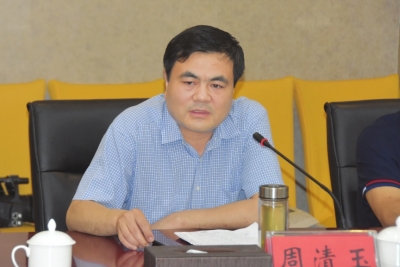
Zhou Qingyu, member of the Standing Committee of Zhenping County Committee and Minister of Propaganda Department
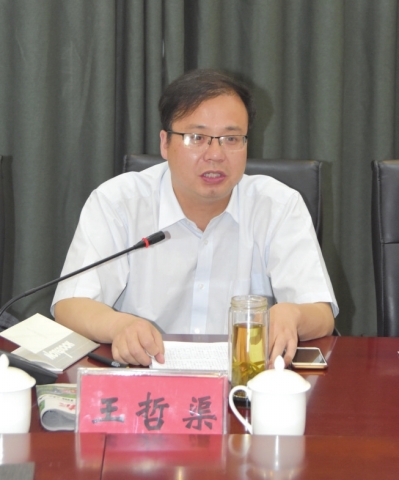
Wang Zhequ, Director of zhenping county Education and Sports Bureau

He Wenhao, Mayor of Gaoqiu Town, zhenping county

Zhang Lei, a teacher at Heihumiao Primary School in Gaoqiu Town.
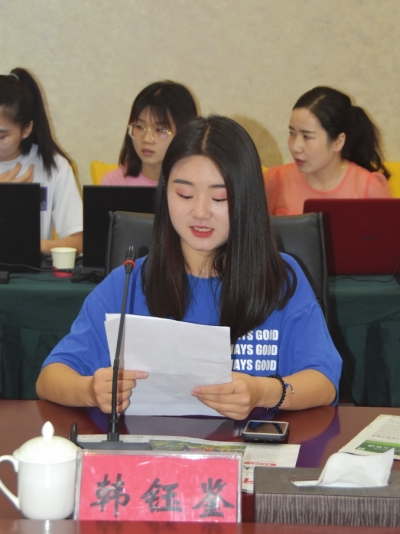
Zhang Yugun student Han Yujian
In March this year, Zhang Yugun, the principal of Heihumiao Primary School in Gaoqiu Town, zhenping county, Nanyang City, was named the fourth batch of national post-study Lei Feng pacesetter. CCTV’s Focus Interview column, Xinhua News Agency, Economic Daily and other domestic mainstream media widely paid attention to and reported Zhang Yugun’s deeds. In particular, on May 7th, the first edition of this newspaper published a long newsletter "The Fireman in the Deep Mountains" and distributed commentator’s articles. After the report was published, it had a strong response from all walks of life.
In order to make the whole society learn and practice the spirit of Zhang Yuguan better, a seminar on Zhang Yuguan spirit was held in zhenping county on the morning of May 29th. During two and a half hours, the leading guests at the meeting had extensive discussions and exchanges on the essence and connotation of Zhang Yuguan spirit from different sides and angles, and how to study and carry forward Zhang Yuguan spirit for a long time under the spirit of the 19th National Congress of the Communist Party of China. The summary of the speech is now selected for readers.
See greatness in the ordinary.
Qin Jun, a famous writer and former deputy director of Nanyang Municipal People’s Congress Standing Committee
I got to know Mr. Zhang Yugun through CCTV’s Focus Interview program and Henan Daily. I am a writer myself, and I seldom shed tears when I read people’s reports. However, I shed tears several times after reading the report of "The Fireman in the Deep Mountains". I was deeply moved by Zhang Yugun’s deeds, and his spirit was admirable.
Zhang Yugun is a teacher worthy of admiration. Chairman Mao said in the article "Serving the People": "It is not difficult for a person to do a good deed, but it is difficult to do good deeds all his life without doing bad things." He is a "Zhang Side-style" person who has been immersed in the mountains for seventeen years, teaching and educating people, and has achieved remarkable results. A mountain village has graduated 16 college students, and this achievement is not easy to achieve even in some plain areas. "Seeing greatness in the ordinary" means Zhang Yugun.
It is often said that behind a successful man, there is a good woman, and behind Zhang Yugun, there is not only a good wife but also a good family. When he hesitated whether to leave this poor mountain village to earn money and develop in other places, his father, party member, an old village cadre for many years, patted him on the shoulder and said, "A good man is to keep his promise, endure loneliness and shoulder the responsibility." His wife used to work in other places to earn money, but she resolutely returned to her hometown for her husband’s career, and together with him, she supported the school of Black Tiger Temple and the hope of the children. And his nephew, Zhang Lei, has already worked in Shenzhen, but for the education in his hometown and the career that his uncle loves, he also chose to come back to teach and educate people. Therefore, when we study and publicize Zhang Yugun, we should also study his family. Without a good family, there may be no birth of Zhang Yugun. His appearance is not accidental. Nanyang has a long history and rich cultural heritage. Since ancient times, there have been many heroic model workers in Nanyang, and good people in Nanyang have become a phenomenon, and Zhang Yugun is one of them.
While publicizing, studying and studying Zhang Yugun, we should also compare ourselves. Zhang Yugun took root in the mountainous area with extremely meager income and dedicated his youth to the children in the mountainous area. Can we do it? He regards the education in mountainous areas as his own family business, caring and caressing the students, which can be said to be meticulous. Even for children, I learned to cook with a spoon, sew with a needle and thread, repair a desk and make up a school building. His spirit of Do not forget your initiative mind, devoting himself to teaching, educating people carefully and struggling hard is worth learning from each of us.
He is a model for party member cadres to learn.
Song Yang, Deputy Secretary of Party Committee of Nanyang Municipal Government.
Zhang Yugun’s deeds are touching and inspiring. With his loyal faith, strong will and passionate love for education, he has made extraordinary achievements in his ordinary post for seventeen years. He faithfully carried out the solemn promise of a Communist party member with practical actions. He is an outstanding representative of Communist party member and an example for teachers and all cadres in party member.
Zhang Yugun is a mirror. In him, we understand loyalty, persistence, dedication, selfless dedication and optimism. Like all normal people, he hesitated in the face of bad conditions, but in the end he chose to stick to it for the children in mountain schools. For seventeen years, he loved children, schools and education, and worked hard in the ordinary post of rural teacher. There was no grandiose words, only "don’t delay a class, do everything possible to do every class well." Seventeen years in the wind and rain, Zhang Yugun devoted almost all his efforts to the school, gave all his love to the students, and regarded dedication as a habit. The treatment is not high, but it is safe; Material poverty, but spiritual wealth. His optimistic and positive attitude towards life has always kept him enthusiastic about his work and enabled him to overcome countless difficulties calmly.
From Zhang Yugun, we can clearly feel that no matter what occupation you are engaged in, no matter what position you stick to, you can create extraordinary achievements in any position as long as you are idealistic, down-to-earth, pragmatic and enterprising. Mr. Lu Xun said: "Since ancient times, there have been people who have worked hard, who have worked hard, who have pleaded for the people, and who have sacrificed their lives for the law … This is the backbone of China." Zhang Yugun has been working hard for seventeen years, and Do not forget your initiative mind is also the spiritual backbone of the Chinese nation.
Every party member cadre should learn from Zhang Yugun, love his job, start from ordinary things, firmly root the advanced nature of Communist party member in his post, deeply embody it in his work, let the ordinary post shine brilliantly, let Zhang Yugun’s spirit take root and blossom in Nanyang, and let more "Zhang Yugun" emerge constantly, making positive contributions to accelerating the transformation and leaping development of Nanyang and winning the victory in building a well-off society in an all-round way.
Continue to play an exemplary guiding role
Wang Guangling, Deputy Director of Propaganda Department of Nanyang Municipal Committee
Learning Zhang Yugun’s spirit can be summarized as "three learning and three doing".
We should learn from his dedication and be a persistent person. In August 2001, 21-year-old Zhang Yugun learned from the old headmaster Wu Longqi that there was a shortage of teachers in the school, and resolutely became a private teacher who received a monthly subsidy from 30 yuan and then distributed 100 kilograms of grain at the end of the year, and took root in the depths of Funiu Mountain surrounded by mountains. During the five years since Zhang Yugun first arrived at the Black Tiger Temple, relying on a pole, he picked out daily necessities for children and also picked up hope. Faced with the lack of funds and no money to hire people to cook for the children, Zhang Yugun called back his wife who was working outside the home, and the family lived on his meager salary. From the "old pole" to the "small motorcycle", he carried the responsibility.
Learn from his professionalism and be a conscientious person. "Don’t delay a class, do everything possible to do a good job in every class", which is the iron discipline set by Zhang Yugun for himself! Zhang Yugun trained himself as a "all-round" teacher. He carefully studied the curriculum standards, optimized every link of the curriculum, and used field practice to help children understand the mystery of science classes. And he uses all his rest time to keep charging in order to teach the children well.
Learn from his moral spirit and be a noble and pure person. For seventeen years, Zhang Yugun kept the promise of the old headmaster day by day, and took the profession of teacher as his lifelong pursuit, regardless of remuneration and working environment, and was willing to be ordinary. In the past seventeen years, the teachers here have changed crop after crop, but he has been sticking to this remote mountainous area, sticking to simplicity and poverty, cultivating and harvesting that beauty.
Zhang Yugun is not just a typical person. From him, we can not only see the great love and selflessness of human nature, but also deeply feel the power of example. It takes three generations to make a gentleman. What educators shoulder is the future of our country and nation. Teacher Zhang Yugun is a well-deserved model of teachers’ morality. As cadres in party member, we should learn deeply from the spirit of Zhang Yugun and carry it forward.
Zhang Yugun is a representative of excellent teachers.
Long Yunfei, deputy director of Nanyang Education Bureau and member of the party group.
Comrade Zhang Yugun is another advanced model emerging in Nanyang education system in recent years after Guo Chunpeng.
To learn from Zhang Yugun, we must learn from his firm belief in Do not forget your initiative mind and taking root in rural education. In Heihumiao Village Primary School, Zhang Yugun kept his promise, shouldered his responsibility and propped up a sky of rural education with practical actions; To learn from Zhang Yugun, we must accurately grasp his firm belief in Do not forget your initiative mind and taking root in rural education. He faced difficulties, went forward bravely, kept improving in teaching, devoted himself to studying, used various teaching methods flexibly, and at the same time loved learning and improved himself. To learn from Zhang Yugun, it is necessary to accurately grasp his professional sentiment of devoting himself to teaching and being an innocent teacher. His noble ethics of educating people carefully and always cherishing great love persuaded his wife who worked outside to help look after the left-behind students, cook for them, do laundry and mend their clothes, and take care of their daily lives. In the past 17 years, Zhang Yugun has helped more than 300 children with his meager salary, and never let a student drop out of school because of poverty.
In recent years, under the correct leadership of the Municipal Party Committee and the municipal government, and with the unremitting efforts of the educators, Nanyang’s educational resources have been continuously expanded, the educational development environment has been continuously optimized, quality education has been comprehensively promoted, the growth mode of education quality has been further changed, and the quality of college entrance examination has achieved "seven consecutive increases". However, achievements only represent the past. How to meet the new expectations of Nanyang people for Nanyang education in the new era urgently needs a large number of educators who strive for perfection and study hard.
Nanyang Education Bureau has issued the Decision on Learning from Comrade Zhang Yugun in the city’s education system, calling on the city’s education system to carry out extensive learning activities from Comrade Zhang Yugun. Various counties, districts and schools have carried out activities to learn from Comrade Zhang Yugun in various forms. At the same time, they have combined the study of Zhang Yugun’s spirit with the ongoing activities to create a civilized campus, and publicized Zhang Yugun’s advanced deeds through seminars, billboards and lectures.
Zhang Yugun is an outstanding representative of teachers in thousands of mountain villages in our city. He represents a vast group of outstanding teachers. In order to expand the effect of the activity, Nanyang Education Bureau has launched the activity of "Looking for Zhang Yugun around us" and launched the selection activity of the most beautiful rural teachers in Nanyang in the whole city. At the same time, the speech contest of "Do not forget your initiative mind, Lide Shuren" was held, aiming at emerging more advanced models through these activities, creating an advanced model group of education in Nanyang and setting a new benchmark for the construction of teachers’ morality in Nanyang.
Provide spiritual support for the high-quality development of county economy
Li Xianqing, Secretary of CPC Zhenping County Committee
Lei Feng spirit is a vivid embodiment of socialist core values, and it is our responsibility to spread Lei Feng spirit on the motherland. Comrade Zhang Yugun’s deeds have aroused strong repercussions after being reported by media at all levels. This is not only a personal glory of Comrade Zhang Yugun, but also a benchmark and a model, which will surely inspire the cadres and masses in the county to see the good and do good, and release their responsibilities and actions in the new era.
Comrade Zhang Yugun is as the name implies. After years of flowing and accumulation, this piece of "rough jade" has been honed and beaten by practice, and finally it has become a jade and shines. Comrade Zhang Yugun created extraordinary value in his ordinary post, and the key lies in his Do not forget your initiative mind, devoted teaching, careful education and hard work, and writing the story of Lei Feng in the new era with practical actions. In Comrade Zhang Yugun, we can see four spiritual characteristics: First, the energy of faith. For a solemn promise, he silently adhered to it for 17 years and remained steadfast. Do not forget your initiative mind sowed the "fire" for the children in the mountains to walk out of the mountains and grow into talents. The second is the mind of great love. Comrade Zhang Yugun loves school as home, loves life as a child, "being a teacher during the day and being a parent at night", selfless dedication, asking for nothing in return. The third is the spirit of selflessness. He doesn’t care about "the outside world is wonderful" and always sticks to it; Don’t care how hard the conditions are, always optimistic; Regardless of personal fame and gain, always be conscientious. The fourth is enterprising spirit. No matter how busy and tired Zhang Yugun is, he never forgets to study. After completing the junior college course by himself, he is teaching himself an undergraduate course, vowing to make himself an all-round teacher.
Teacher Zhang Yugun, as Lei Feng in the new era, is a living teaching material for entrepreneurs and a good example for Si Qi. We will take this seminar as a new starting point, carry forward the main theme, stimulate positive energy, and constantly lead the spirit of Zhang Yugun deeper. First, continue to learn and set a benchmark. Organize various learning activities, take Zhang Yugun as an example, and create a strong atmosphere of "advocating advanced, learning advanced and striving to be advanced". The second is to see the direction of Si Qi. Combined with the educational activities with the theme of "Do not forget your initiative mind, Keep Your Mission in Mind", a decision was made to learn from Comrade Zhang Yugun. The third is to solve problems for the people. Take the overall situation of economic and social development as a whole by tackling poverty, grasp the essence of precision, and ensure that poverty is lifted as scheduled. The fourth is to encourage practical and innovative industries. Combining supervision with love, paying equal attention to incentives and constraints, vigorously implementing the "two rounds and two wings" strategy, and re-emphasizing the "nine special projects" to promote the high-quality development of the county economy.
Strive to form a moral chain effect
Zhou Qingyu, member of the Standing Committee of Zhenping County Committee and Minister of Propaganda Department
Since September 2012, through continuous excavation, cultivation, publicity and promotion in the past seven years, the shining deeds and lofty spirit of Zhang Yugun, a mountain village teacher, have been well known, spreading on the fertile fields of spiritual morality like spring breeze, which has bred the era style of "peaches and plums don’t say anything, and the next step is self-made".
In March of this year, Zhang Yugun was named "National Leifeng Model of Post Learning" by Publicity Department of the Communist Party of China. Zhenping County Committee made a decision to advocate learning from Zhang Yugun’s ideal pursuit of taking root in the mountains and villages. At the same time, mainstream media such as Focus Interview, Xinhua News Agency, People’s Daily, Guangming Daily and Economic Daily widely reported Zhang Yugun’s deeds, especially Henan Daily’s long newsletter "The Fireman in the Deep Mountains", which had a strong response from all walks of life and formed a sensational effect, and became a typical propaganda in our county.
Over the years, our county has insisted on vigorously carrying forward the spirit of Lei Feng as the main starting point for practicing the socialist core values, and promoted the activities of learning from Lei Feng to gradually move towards the track of normalization and institutionalization. Nowadays, the models represented by Zhang Yugun emerge one after another and become a beautiful landscape active in Yuxiang.
Comrade Zhang Yugun’s noble qualities of hard-working and shouldering heavy burdens, his noble sentiments of dedication and selfless dedication, and his spirit of assiduous study and innovation are worth learning from each of us. In the next step, our county will take the forum on the spirit of Zhang Yugun as an opportunity to integrate the spirit of Zhang Yugun into the work and life practice of the broad masses of cadres and people and turn it into practical actions to promote the transformation and leap-forward development of Zhenping.
The first is to strengthen publicity and promotion. We should be good at discovering, excavating and cultivating Zhang Yu’s advanced model, strive to form a moral chain effect of "lighting a lamp and illuminating a large area", and constantly introduce moral models, good people around us and outstanding poverty alleviation cadres. The second is to highlight practical characteristics. Combine the study of Zhang Yugun’s spirit with the propaganda and education of the socialist core value system, with the promotion of spiritual civilization, and with the development of social volunteer service activities to promote the coverage of learning activities to all classes and fields. The third is to innovate ways and means. Incorporate the activity of learning Zhang Yuguan into the innovative project of propaganda and ideological work. Give full play to the advantages of emerging media, and make use of emerging communication methods such as blogs and Weibo to carry out the activities of learning and publicizing Zhang Yuguan with modern elements.
In the new era, let’s unite as one, strongly promote the spirit of Zhang Yugun to be passed down from generation to generation in the new era, and provide a strong spiritual force for building a beautiful town!
Encourage teachers to be "four haves" good teachers
Wang Zhequ, Director of zhenping county Education and Sports Bureau
As an ordinary teacher, Zhang Yu went to Do not forget your initiative mind and devoted himself to teaching and educating people carefully. This spirit of hard struggle is inseparable from Zhenping’s fine tradition of respecting education and respecting teachers. It is precisely because he took the lead in setting an example and passing it on from generation to generation that he attracted more colleagues to join the education groups in mountainous areas and jointly shouldered the historical responsibility of revitalizing rural education in Zhenping.
Teacher Zhang Yugun has been deeply rooted in the education in the mountains for 17 years. This sincere heart has washed the minds of educators, and it also shows that the county party committee and government attach great importance to the construction of rural teachers. In the construction of rural teachers, we have formulated relevant policies to encourage teachers to teach in mountainous areas in terms of teacher recruitment, teachers’ ability improvement, rural school-running conditions and rural teachers’ treatment. Carry out the activity of "sending teachers to the countryside" in improving teachers’ ability, and provide free training for principals and teachers in poor villages; In terms of improving the conditions for running schools in rural areas, we have invested 34.25 million yuan in recent years to build 681 sets of teachers’ revolving dormitories, gradually solving the accommodation problem for rural teachers; In terms of improving the treatment of rural teachers, we give rural teachers living allowances, subsidies for teachers’ work in villages and towns, and subsidies for teachers in deep mountain areas. It is the implementation of these good policies and good treatment that can lead the construction of rural teachers in the city.
Teacher Zhang Yugun’s outstanding deeds deserve our study and deep thought. We have the conditions, responsibilities and obligations to take the lead and set an example in learning his deeds and spirit. In the next step, we will take teacher Zhang Yugun as a typical example, systematically think about the growth of rural teachers, and constantly improve their sense of accomplishment and honor: First, do a good job in guiding the typical way, vigorously publicize Zhang Yugun’s advanced deeds, and call on the education system to learn Zhang Yugun’s spirit, so that Zhang Yugun’s spirit will become an important connotation and source of the development of Zhenping education; The second is to build a growth platform and help young teachers grow up as soon as possible through the selection activities such as "Three Projects", "Sending Teachers to the Countryside" and "Top Ten Most Beautiful Rural Teachers" and "Top Ten Most Beautiful Young Teachers". The third is to revitalize the teaching staff, further rationalize the teacher system and mechanism under the guidance of the reform opinions on the construction of the teaching staff in the new era, and attract more outstanding talents to take root in rural education.
Teacher Zhang Yugun’s advanced deeds are both encouragement and spur. His spirit inspires teachers to be worthy of the name "four haves" and be "four guides" in the new era.
Work hard with the spirit of Zhang Yugun as the driving force.
He Wenhao, Mayor of Gaoqiu Town, zhenping county
The Party Central Committee pointed out: "Xiu De should not only aim high, but also base itself on the plain." I was deeply moved by teacher Zhang Yugun’s deeds. In the past 17 years, he has done trivial things in detail with bit by bit actions, igniting hope for children in the mountains and illuminating their future. The value of Zhang Yugun’s spirit lies in his persistence. With extraordinary perseverance and persistent heart, he unreservedly dedicated his youth to the education in mountainous areas and made extraordinary things in an ordinary post.
The power of example is infinite, and Comrade Zhang Yugun has set an example for us. As a cadre in party member, it is necessary to learn from his unremitting persistence and efforts, and learn from the "nail" spirit like Lei Feng. A pole was passed from the old headmaster to Zhang Yugun’s hand. In the years when the road was blocked, in the wind and rain, Zhang Yugun leaned on this pole to pick up books, teaching AIDS and daily necessities, and what he picked up was the hope of the children!
We in Gaoqiu Town should vigorously carry forward and learn from Comrade Zhang Yugun, educate, guide and inspire the vast number of party member cadres in the town with typical examples around us, further boost their spirits, and gather strong positive energy for realizing the stable poverty alleviation of the poor. Gaoqiu Town is facing the problems of getting rid of poverty, safe production, environmental protection and so on. The task is very arduous. We need this kind of struggle spirit of Comrade Zhang Yugun. We should take this as the driving force, vigorously carry forward the fine tradition and style of hard work and solid work, and guide the broad masses of party member cadres to focus on the entrepreneurship of officials and concentrate on promoting development.
Good colleagues around me
Zhang Lei, a teacher at Heihumiao Primary School in Gaoqiu Town.
I returned to my hometown, Heihumiao Village, and became a teacher in 2014. Over the past five years, I have lived with Mr. Zhang Yugun day and night and witnessed his words and deeds, which gave me a new understanding of education.
Teacher Zhang is a man who is not afraid of difficulties and dares to carry heavy burdens. In my first year of teaching at Black Tiger Temple Primary School, at the beginning of the new semester, Mr. Zhang rode his worn-out motorcycle on the mountain road to transport the school supplies that students needed for class. According to the school teacher, when the mountain road was impassable before, Mr. Zhang used a pole to carry the school supplies up the mountain. I don’t know how much sweat was spilled on the 18-bend mountain road. It was not until the mountain road was repaired that the pole was replaced by a motorcycle. On the way, I clearly saw that the wheels of that motorcycle had been ground without a ripple. The long road of more than ten years has polished not only the bright and clear pole, but also the bare tires, and also the character of Mr. Zhang’s hard work and perseverance.
Teacher Zhang is extremely dedicated to his post. Once, Mr. Zhang rode a motorcycle to the town for a meeting in the morning, accidentally ran over a rock that fell from the mountain, and passed out on the spot. It took half an hour for the villagers to find him and take him to the hospital. During the hospitalization, he did not forget the school affairs and could not let go of the children. After only being hospitalized for half a month, he appeared on campus with crutches.
Teacher Zhang has a strong interest in teaching and research. As the principal, he felt that he graduated from Nanyang No.2 Normal School and it was difficult to adapt to the current educational situation, so he bought a lot of professional books online and found time to teach himself. At present, he has completed the junior college course by himself and is teaching himself the undergraduate course. Teacher Zhang not only studies by himself, but also downloads excellent lessons from the Internet, calling on teachers to study together. It is precisely because of his keen interest that the subjects he teaches are among the best in the town every year, and the overall teaching quality of the school is also rising year by year.
During my five years as a teacher, I have heard the stories told by teachers about Mr. Zhang, and I have also seen Mr. Zhang’s concern and care for the children. Teacher Zhang really regards the school as his home and treats every child as his own. He is not only a good colleague around me, but also a good teacher in my educational career. I want to stick to the Black Tiger Temple like Teacher Zhang Yugun and let more children walk out of the mountains!
Teacher’s kindness is more important than mountain.
Zhang Yugun student Han Yujian
I am a sophomore in nanyang normal University, and I feel very honored to attend the seminar as a student representative today.
In my five-year study career in primary school, I lived in Black Tiger Temple Primary School for three years. I clearly remember the first time I met Mr. Zhang. It was August 31, 2008. It was raining incessantly in the morning. I was carrying a worn-out schoolbag. My father held an umbrella in one hand and a snakeskin bag in the other. He led me on foot through a dozen-mile mountain road, which lasted for more than two hours. When my father and I arrived at the door of the third grade classroom, we were soaked to the skin. Facing the eyes and snickers of my classmates, I hid behind my father. "It’s Han Yujian. Everyone is here. Come in and sit down." A gentle voice broke the awkward atmosphere. After my father left, I stood there motionless and never dared to raise my head. At this time, the gentle voice sounded again: "Oh dear! You are all wet, come with me! " I followed him to the office, and he helped me take the quilt out of the snakeskin bag. He said with concern, "This quilt is half wet, but fortunately, the clothes are not wet yet. Please change your clothes quickly, but you can’t catch a cold!" Say that finish, he turned to leave. In a strange environment, teacher Zhang’s concern swept across my heart like a warm current, and my tears came to my eyes. I knew it was tears moved by happiness. Thank you, Miss Zhang! Perhaps you have forgotten this trivial matter for a long time, but for me, it was the first warmth I felt when I first arrived in a different place, and I will cherish it all my life.
Mr. Zhang is the only teacher with a high degree in our Black Tiger Temple Primary School, and he can easily do every course. We all like Mr. Zhang’s class. In Chinese class, he leads us to recite famous classics and appreciate beautiful prose and poems, just like talking to the ancients directly and swimming in the ocean of Chinese language, which makes us deeply feel the charm of Chinese language and literature. In math class, he personally made teaching AIDS, taught us ruler and ruler drawing, and made us appreciate the infinite mystery of the digital world; In physical education class and art class, he took us to climb mountains to see the scenery and taught us to paint the green mountains and green waters of our hometown with pens …
In 2016, I was admitted to nanyang normal University, and I chose the major of art education. I am determined to be a good teacher like Mr. Zhang. Every holiday, I will go back to my alma mater, Black Tiger Temple Primary School. The teachers and students of the school come in batches and leave in batches. The only thing that remains unchanged is teacher Zhang’s persistence.
Teacher Zhang, it’s good to be your student!
